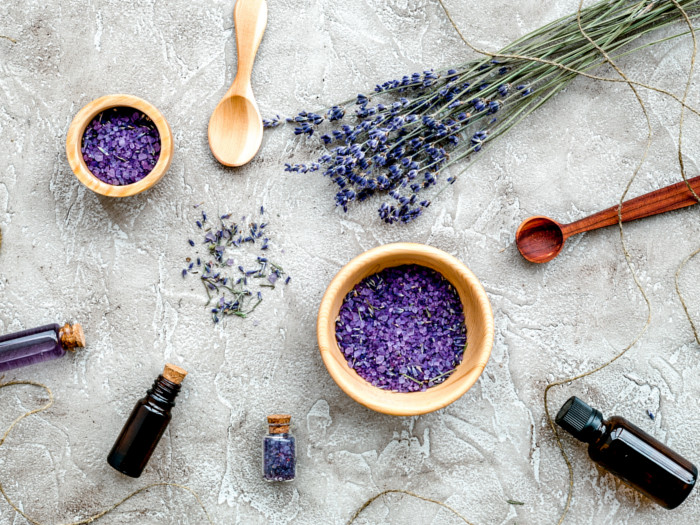Using lavender oil for skin has been a traditional aromatherapy practice because of the essential oil’s powerful moisturizing, antibacterial, and antiseptic properties. Lavender oil helps prevent acne breakouts, reduce skin inflammation, speed wound healing, soothe minor burns, and treat eczema. The essential oil has been used in traditional Chinese medicine for its pain-relieving abilities. The relaxing fragrance of lavender also helps reduce stress levels in the body.
Lavender Oil For Skin
Let us look at the most important benefits and uses for lavender oil for skin.
Lavender Oil For Acne
Lavender oil is one of the best essential oils to treat acne, boils, and abscesses as it has antibacterial and anti-inflammatory properties. You can apply lavender oil diluted in water to facial skin to help detoxify the skin, heal acne, as well as prevent acne breakouts. Alternatively, you can blend lavender and coconut oil or witch hazel and apply on acne-prone skin. [1]
Soothes Eczema & Dry Skin Conditions
According to The Illustrated Encyclopedia of Essential Oils by Julia Lawless, lavender oil helps treat eczema and dry skin. You can also use a blend of lavender and jojoba oil to moisturize the skin and reduce the itchiness. [2]
For dry, cracked heels, apply a blend of lavender and coconut oil on your feet and wear a pair of clean socks. Wear it overnight and wash your feet in the morning. You will notice the skin becomes soft and moisturized in a few days.

Lavender essential oil promotes relaxation and treats anxiety. Photo Credit: Shutterstock
Anti-inflammatory Properties
Lavender oil has anti-inflammatory and analgesic properties, as confirmed by an animal study conducted by a team of Brazilian researchers. Several studies have investigated the relaxing and sedative properties of the oil and assessed that it can help calm the immune system as well as have a relaxing mental effect. [3] [4]
Lavender oil mixed in a carrier oil like coconut oil can be topically applied to reduce the inflammation caused due to minor burns and bug bites. The oil can also help numb pain caused due to headaches, toothaches, sprains, and sores.
Antifungal Properties
A comparative study of lavender essential oil, lavender brew, and a popular anti-fungal cream showed that lavender oil had the most antifungal efficacy, particularly on Candida skin infections, athlete’s foot, and ringworm. Researchers suggest that lavender may be a suitable substitute for chemical drugs and can also be used as an alternative treatment. [5]
Speeds Wound Healing
You can also apply lavender oil on cuts, scrapes, and wounds for speedy healing and for its antiseptic properties. A 2016 report published in the BMC Complementary and Alternative Medicine revealed that topical application of lavender oil increased collagen production and helped heal wounds. Researchers found that treatment with lavender oil on wounds on laboratory rats increased the formation of granular tissue, accelerating the wound healing process. [6] [7]
Lavender Oil For Skin Lightening
The Aromatherapy: Essential Oils for Vibrant Health and Beauty by Roberta Wilson suggests using lavender oil for skin lightening, hyperpigmentation, and for the prevention of stretch marks. [8]
May Prevent Wrinkles
Wrinkles and fine lines are formed mainly due to overexposure to the sun and oxidative stress in the body. Antioxidant-rich lavender oil has a dual effect as it protects the skin from harmful UV radiation and has antiradical properties. [9]
Insect Repellant
Lavender oil can be used as a mosquito repellant as well as a disinfectant, according to The Directory of Essential Oils. It helps repel insects and kills parasites as well as lice. [10]
How To Use Lavender Oil For Skin?
Pure lavender oil can be safely topically used on the skin, including facial skin. You can also ingest it but it is best to consult a doctor or a certified herbalist before using an essential oil treatment. Alternatively, the oil can be used as a mist spray, massage oil, or in an aromatherapy diffuser.
Word of Caution: Some people can have an adverse reaction to lavender oil. It is always best to test a small area on your wrist to see if you are allergic to the oil. Lavender oil can also cause drowsiness, so it is advisable not to take it with other sedatives. [11]
